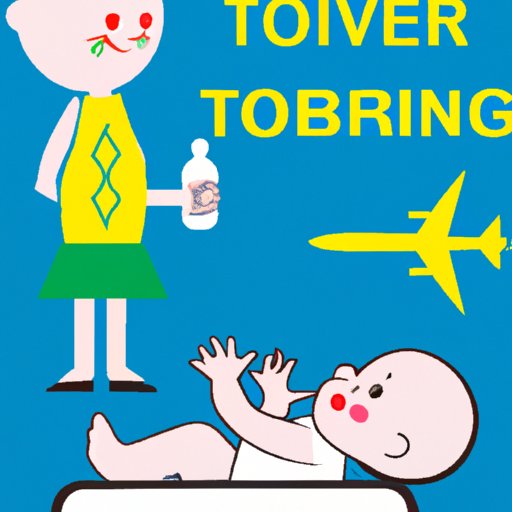Introduction
Traveling with a newborn on an airplane can be a daunting experience. From researching airline policies and restrictions to packing the right supplies, there is a lot to consider before boarding a flight with a baby. But with the right preparation and knowledge, a family can make the most of their journey and ensure a safe, stress-free experience.
First, it’s important to understand what constitutes a newborn. Generally, a newborn is considered to be a baby up to three months old. However, some airlines may have different definitions and restrictions, so it’s important to research the specifics for your particular carrier.
There are many reasons why parents might want to fly with a newborn. Some may need to travel for work or visit family, while others simply want to explore the world with their baby in tow. Whatever the reason, understanding the guidelines and regulations for air travel with a newborn is essential.

Tips for Traveling with a Newborn on an Airplane
Before booking a flight, it’s important to research airline policies and restrictions. Most airlines will allow infants to travel on domestic flights as long as they are accompanied by an adult, but there may be additional fees or restrictions. It’s also important to plan ahead when booking flights, as some carriers may require that infants be booked at least seven days in advance.
When selecting a seat, it’s best to choose one that has extra legroom and is close to the lavatory. This will make it easier to access supplies and take care of the baby during the flight. It’s also important to bring the right supplies, such as diapers, wipes, formula, bottles, and a change of clothes. If possible, pack light but make sure you have everything you need.
How to Prepare for Flying with a Baby
Booking a nonstop flight will minimize the amount of time spent in the air and reduce the risk of delays. It’s also important to arrive early at the airport to give yourself plenty of time to check in and go through security. Be prepared for security checks, as babies may need to be taken out of their car seats or strollers.
Finally, make sure to pack the essentials. Bring enough diapers, wipes, and formula to last the duration of the flight, as well as any other items the baby may need during the flight, such as a pacifier or noise-canceling headphones. Don’t forget to bring an extra set of clothes for the baby, just in case of accidents.
The Pros and Cons of Taking a Newborn on a Plane
Like anything else, there are both pros and cons to taking a newborn on a plane. On the plus side, it can be a convenient way to travel and a great bonding experience for parent and baby. On the other hand, the environment can be stressful for both baby and parents, and there are potential health risks associated with air travel.

What You Need to Know Before Boarding a Flight with a Newborn
Before boarding a flight with a newborn, it’s important to have a plan for feeding and changing the baby. Make sure you have enough diapers, wipes, and formula to last the duration of the flight. Bring a pacifier or noise-canceling headphones to help soothe the baby during takeoff and landing. And don’t forget to bring an extra set of clothes for the baby, just in case of accidents.
Flying with a Baby: What to Expect
When flying with a baby, expect noise and distractions. Babies can get fussy and there may be crying or fussing throughout the flight. However, if you’re prepared and have the right supplies, it can be a comfortable and convenient experience.
It’s also important to consider safety. Make sure the baby’s car seat or stroller is approved for air travel and follow all instructions for use. During takeoff and landing, keep the baby in their seat and make sure their seatbelt is securely fastened.
Conclusion
Traveling with a newborn on an airplane can be a rewarding experience, but it’s important to plan ahead and be prepared. Research airline policies and restrictions, book nonstop flights, and bring the right supplies. Above all, make sure to prioritize safety and comfort throughout the journey.
For more information on flying with a baby, check out the resources available from your airline and the Federal Aviation Administration. With the right preparation, your family can make the most of their journey and enjoy a safe, stress-free experience.
(Note: Is this article not meeting your expectations? Do you have knowledge or insights to share? Unlock new opportunities and expand your reach by joining our authors team. Click Registration to join us and share your expertise with our readers.)
